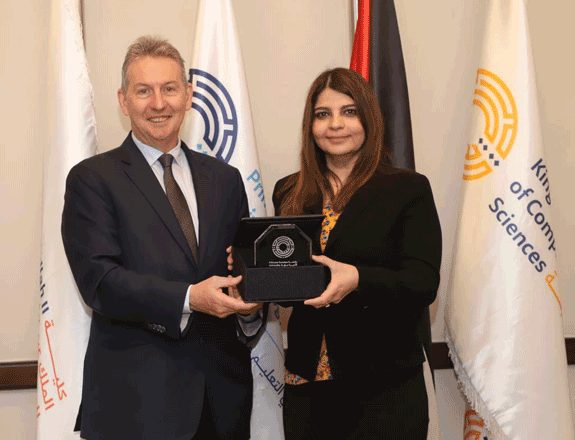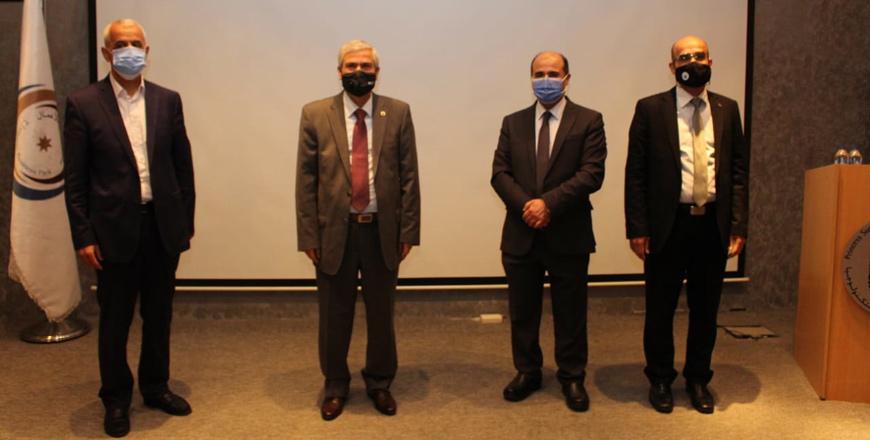You are here
Academics, industrialists urged to work more closely
By Dana Al Emam - Apr 13,2016 - Last updated at Apr 13,2016
AMMAN — Academics and industrialists are encouraged to enhance partnerships, particularly in the pharmaceutical field, to build on achievements and capitalise on mutual benefits, stakeholders agreed on Wednesday.
The two parties should take the initiative to enhance cooperation and find a middle ground for possibly conflicting interests, panellists at a conference that looked into building successful partnerships between the academia and industry, with a focus on the pharmaceutical sector, said.
Organised by the Friedrich Naumann Foundation for Liberty and the Jordanian Club of Humboldt Fellows, and attended by HRH Princess Sumaya, the conference looked into challenges facing partnerships and means of bridging gaps.
Princess Sumaya, president of the Royal Scientific Society and chairperson of the board of trustees of the Princess Sumaya University for Technology (PSUT), said bridging the gap between industry and academia is "vital" to the future prosperity of the pharmaceutical sector and the wider economy.
This collaboration, she said, must begin at the level of universities and schools, in a manner that focuses more on nurturing research skills among students and faculty members.
The challenge is creating a research-based learning system that feeds into the job market, fulfilling employment needs and encouraging innovation, the princess added, citing the experience of PSUT as an example.
She noted that the current connection between research and development in Jordan is "not very strong".
Academics and industrialists should reconcile their differences in mindsets and goals, the princess added, explaining that academics usually publish research for promotion purposes, while industrialists are more business-oriented.
Trade Minister Maha Ali highlighted the role of the partnership between academia and industry in increasing Jordan's pharmaceutical exports, which form 11 per cent of Jordan's total exports, citing some 150 local pharmaceutical companies exporting to 60 countries.
She added that the ministry is currently finalising its plan for the upcoming three years and is willing to take into consideration suggestions of academics and industrialists on how cooperation can be enhanced.
She added that the ministry is working on setting a strategy for its fund for supporting industrial research and development.
For his part, Salah Mawajdeh, corporate vice president at HIKMA Pharmaceuticals, said academics tend to conduct research at a very early stage that industrialists find "unfeasible".
Furthermore, he said researchers tend to focus their efforts on "good-to-know" basic research, which requires large investments for a long term, while the industry sector needs applied research with a problem-solving orientation that helps enhance the creativity of products.
The academia and the industry sectors will have a bigger impact if they do not work in isolation, said Azmi Mahafzah, interim president of the University of Jordan.
He highlighted the role of student internship programmes at industrial firms and factories to help them acquire a business-oriented perspective, and he encouraged developing a programme for faculty members to spend their sabbatical leaves at business institutions.
Ralf Schoer, deputy head of mission at the German embassy in Amman, highlighted the interrelatedness between university education and businesses in Germany through apprenticeship and research programmes.
He cited over 800 German and foreign pharmaceutical firms in his country in several sizes, hiring some 110,000 employees, one third of whom are university graduates.
He added that Germany is the third country with pharmaceutical patents after the United States and Japan, with some 12,000 patents.
Related Articles
AMMAN — Deputising for HRH Princess Sumaya, chairperson of the board of trustees of Princess Sumaya University for Technology (PSUT), Presid
AMMAN — HRH Princess Sumaya, president of the Royal Scientific Society and Chair of the Board of Trustees of Princess Sumaya University for
AMMAN — President of Princess Sumaya University for Technology Mashhoor Al Refai honoured researchers Ahmad Hiasat and Mohammad Sababheh for


















